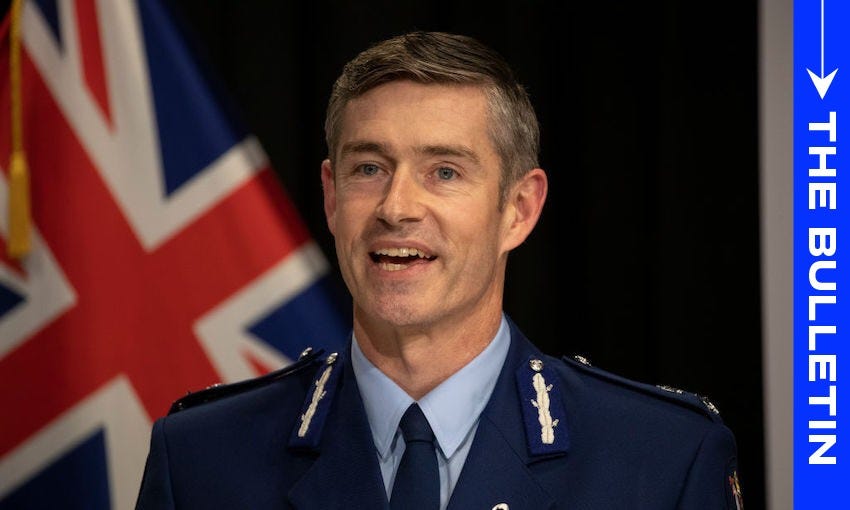Outgoing police boss hopes the role remains politically neutral
Andrew Coster will leave his position early to head the revamped Social Investment Agency.
Mōrena, and welcome to The Bulletin for Wednesday, September 25.
In today’s edition: Congestion charging in Auckland pushed back, the defamation drama behind a deleted podcast, and another high profile supporter for a capital gains tax. But first, the police commissioner is leaving his job early.
Coster goneburger
The timing was somewhat unexpected, but the announcement itself had been anticipated for a while. It was confirmed yesterday, as Stuff reported here, that police commissioner Andrew Coster would be stepping aside from his position and moving to become chief of the Social Investment Agency. Coster’s term as commissioner was due to end in April, but would now conclude in early November. “Policing is an incredibly rewarding and satisfying career and I am proud to have been part of this organisation for nearly 28 years,” Coster said.
Acting public service commissioner Heather Baggot welcomed the appointment, calling Coster a “highly respected and impressive public service leader”. While senior members of the government had only glowing reviews of Coster yesterday, that’s not how it’s always been.
‘Cuddles Coster’ the ‘wokester’
Coster has been police commissioner since 2020, appointed under former prime minister Jacinda Ardern. “I've observed [Coster’s] passion for a police force that knows its strength lies in what it can achieve with the community it serves,” said Ardern at the time. It didn’t take long for National, then in opposition, to take issue with Coster. For National, Coster was part of a regime that they considered soft on crime, particularly around gangs, explained Andrea Vance in a profile for Stuff in 2022. He was labelled “cuddles Coster” by his critics, reportedly including some current cabinet ministers, while ex-MP Simon Bridges accused him of being a “wokester”.
Since taking office, the coalition government has tempered its criticism of the outgoing commissioner – though not immediately. Shortly after the election, explained Jared Savage and Sam Sherwood for the Herald (paywalled), police minister Mark Mitchell labelled the “policing by consent” model championed by Coster under Labour a “failure”, and urged a return to “back-to-basics” policing. Coster had previously defended the approach by referencing violent clashes with the police over issues like Black Lives Matters in the US. “That is what it looks like when police lose the consent of their communities.”
In December, police minister Mark Mitchell ultimately confirmed Coster had his full support – though it took a while for him to make that declaration. The pair have fronted several policy announcements in recent months as the government pushes ahead with its agenda.
Who could take his place?
Coster’s early departure was convenient for the government, given it allows them to bring someone of their choosing into the top police job earlier than expected (given the commissioner position is independent of the government, it’s hard to boot someone out without very good cause). Coster, reported the Herald’s Claire Trevett, urged the government to keep the police commissioner role politically neutral. “We have to do our best to sit in that politically neutral space, but sometimes that can be hard when issues are being contested very strongly, and inevitably policing gets a reflection on that,” he said.
Speaking to RNZ’s Checkpoint, Police Association president Chris Cahill agreed that politicians had been interfering in operational decisions, and the line “had become increasingly blurred”. Whoever replaced Coster needed to have wide-ranging experience across different areas of policing.
Jared Savage (paywalled) has eyed up the field of possible contenders to replace Coster, concluding that it’s likely to be a two-horse race between deputy commissioner Jevon McSkimming and assistant commissioner Richard Chambers. The selection process is rigorous, however, and includes a selection panel and final approval from the PM and Mark Mitchell.
Social investment is the other end of the spectrum
Speaking on Newstalk ZB last night, Mitchell said he believed Coster was the “perfect fit” to lead the revamped Social Investment Agency. In his new role, explained The Post’s Luke Malpass this morning, Coster will work alongside government to stop people falling through the cracks early in life and ending up welfare dependent or in prison. Speaking to Newstalk ZB moments ago, Coster said he viewed social investment as the “other end of the spectrum” to his role with police.
Despite the previous clashes between National and Coster, this isn’t exactly a demotion. The Social Investment Agency has been given a promotion under the coalition after falling to the wayside under Labour. It was a core tenet of National’s election campaign, a return to a policy and a viewpoint that had been championed most prominently by PM Bill English. “I want social investment in the bloodstream of how we do things in government,” Christopher Luxon said in April. Coster’s new job forms a crucial part of delivering on that, though as the Herald’s Derek Cheng (paywalled) looked at in April, there remain questions about whether the approach is the right one.
Last week, reported Andrea Vance, the agency had secured a budget twice that of its predecessor, the Social Wellbeing Agency, despite severe cuts to the broader public sector.
Join The Spinoff Members
"Happy to be alive, proud to be a member. Keep up the good work." - Neera, Spinoff member.
If you value our work and want to support us, please consider becoming a member today. Already a member? Thank you!
Auckland won’t get congestion charging before 2026 – AT boss
Auckland won’t have congestion charging in place in time for the opening of the city rail link. BusinessDesk’s Oliver Lewis reports (paywalled) that there won’t be enough time to formally establish a new congestion charging framework before the 2026 opening of the new rail network, given it first requires central government to pass new legislation. Transport minister Simeon Brown intends to introduce a bill this year but it won’t pass until 2025.
“I saw some great symmetry between CRL going live and us having a time-of-use programme in place,” Auckland Transport boss Dean Kimpton said. “I don’t think we can hold to that '26 date; it’ll be after that. It’s just not going to be possible to do it in 12 months.
The defamation drama behind a deleted podcast
Former MP and Hobson’s Pledge founder Don Brash has threatened legal action for defamation against political lobbyist Matthew Hooton and a podcast on which he appeared. The Spinoff’s Duncan Greive has the exclusive details, reporting that Brash was upset after Hooton alleged the ex-National leader promoted views he didn’t agree with. “That is quite preposterous,” Brash told The Spinoff.
The Bulletin won’t republish the comments that prompted the possibility of legal action, though Brash permitted Greive to replicate them with full context in his report.
Greive explains the context here:
Brash told The Spinoff in a pair of interviews that his legal issue was solely with Hooton’s persistent attacks on his integrity. “He didn’t suggest I was wrong. He suggested I was lying, and knew I was lying.” Despite his persistent positioning as a champion of free speech and opponent of cancel culture, Brash considered that aspect of the podcast a bridge too far.
Click and Collect
Christopher Luxon says it’s important New Zealanders understand “foreign interference is a reality from a number of different countries” but will not commit to a public inquiry.
For Politik subscribers, Richard Harman reports that the parliament has established its own “quasi… police force” after giving security staff the powers of search, seizure and arrest. (paywalled)
David Seymour was not happy at being left out of Foreign Minister Winston Peters’ consultations on a vote at the United Nations General Assembly last week.
Another high profile name has thrown support behind a capital gains tax, with ANZ’s boss saying it’s time.
ED patient attempts 19km walk home at night due to long wait.
Foodstuffs says cases of serious assault and verbal abuse have reduced at its stores because of facial recognition technology. Earlier in the year, The Spinoff’s Shanti Mathias asked whether supermarkets could be trusted with the vast amount of data they collect from customers.
Three Oranga Tamariki foster caregivers acquitted of 52 abuse charges in Kaikohe.
Doctors claim NZ First links to big tobacco during heated meeting with minister.
The Darleen Tana saga drags on. The Greens will once again consider party-hopping the now-independent MP at a special meeting next month.
Gabi Lardies explains the crackdown on nangs. Shanti Mathias assesses where the government is falling short on addressing New Zealand's most common type of crime - cybercrime and fraud. Madeleine Chapman joins the throngs at Time Out purchasing the new Sally Rooney book on the dot of midnight. Liam Rātana reviews show Ngā Rorirori, which dazzles but falls short, and I review Katy Perry's new album, which doesn't dazzle and falls short. Duncan Greive dives into the defamation drama behind a deleted podcast featuring Don Brash and Matthew Hooton. Hayden Donnell finds a definitive answer to whether the All Blacks have lost their aura in the spirit realm.
That’s it for this morning, thanks for reading. I’ll catch you back tomorrow.
Want to get in touch? Join the conversation in the Substack comments section or via email at thebulletin@thespinoff.co.nz if you have any feedback on today’s top stories (or anything else in the news).
If you liked what you read today, share The Bulletin with friends, family and colleagues.













I think Andrew Coster has been a excellent police comissioner. Being described as a wokester by Soiymun Brudges should be regarded as a compliment. I want my police force to act with strength when needed but with humility and compassion as well. Policing by consent is a necessary component of any modern police force. National are bully boy blusterous fools. They operate on reckons and dog whistle, evidence based practice for National is simply not in their lexicon.
🧐Is Don "free speech" Brash aware of the "Streisand effect"? Very few knew about the podcast until he decided to sue and now it has been elevated on the radar - or is that his intention as in "all publicity is good publicity" for the likes of him? 🤔